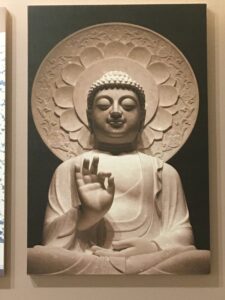So, What’s It Like To Be Asian In The Shambhala Community?
I’ve been in the Shambhala community since the early 1970s, but recently, in the midst of current conversations around race, ethnicity, and belonging, took some time to consider my Asian American identity, and how it “shows up” in different contexts. What are the cultural and political differences, and how do I “belong” to diverse social/community groups? Using a personal lens as a starting point, I would like to invite you to join me in considering how our experiences of culture – learned from birth as well as from current contexts – intersects with behaviors and stances that variously evolve into group belonging or political activity. Of particular interest is how Shambhala practices and teachings of meditation and warriorship might support this contemplation.
https://shambhalaonline.org/calendar-details/?id=494471
*******************************
Being Tara
Tara practice encourages us to tune into her quality of compassion that protects from obstacles to health and supports long life. This talk will explore how Tara practice works with our thoughts, emotions and sense perceptions to create a field of kindness, clarity, and power. I hope to see you there!
White Tara Practice (Online) with Dr. Elaine Yuen | Shambhala Meditation Center of Philadelphia
*********************************
Shambhala Art Part One: Coming to Your Senses
I’m happy be teaching Shambhala Art online for colleagues and friends at Deer Park in Bir, India. So great to collaborate with Pallavi Deshmukh at Deer Park.
*********************************
The Buddhist Journey: An Overview of Teachings and Practices (Online)
https://philadelphia.shambhala.org/program-details/?id=485831
with Dr. Elaine Yuen & Thomas Berthoff
 Part I: First Turning Teachings – September 16 – October 21, 2021
Part I: First Turning Teachings – September 16 – October 21, 2021
Part II: The Mahayana Path – November 4 – December 16, 2021
Time: 7-9 pm Eastern Standard Time
This two-part course will explore the transformational aspects of teachings and practices of the Buddhist Path within the context of history, texts and traditions. Beginning with insights into how humans generate confusion and habitual patterns, we will explore how those insights become the foundation for compassion and skillful means to work with others in contemporary contexts. Students will be introduced to the rich diversity teachings from the perspective of Indo-Tibetan Buddhist “three vehicles.” Practices and optional reflective writing between classes are included to support conceptual understandings.
Part One: First Turning Teachings will outline historical as well as psychological aspects of early Buddhism found in the Abhidharma. Buddhist articulations on the nature of mind, along with important practices, will be included in Part One.
Part Two: The Mahayana Path will explore how compassion is engendered, and the path of the Bodhisattva (Awake Being). An overview of Vajrayana perspectives and practices, such as Dzogchen and Mahamudra, will be included.
Although Parts One and Two are best taken as a sequence, Part One is not a pre-requisite for Part Two, and they may be taken separately.
____________________________________________________________________
Finding Balance in Challenging Times
The interactive public webinar, scheduled for 27 February, will be led by Ani Pema, Dr. Elaine Yuen, and Dr. Nivedita Chalill, and will be chaired by Dr. Kaveri Gill. “These days, social, environmental, and personal disruptions are everywhere. We will explore the role of the Buddhadharma as a vaccine that supports relief and resilience to meet the challenges of our times.”
_____________________________________________________________________
January 29 at 7 pm Eastern time, 8 Atlantic, 4 Mountain, 5 Pacific time
In our diverse society, we often find ourselves working with individuals who have different qualities, backgrounds, and motivations. Part of our practice is to develop genuine communication and connection with all people and their manifestation of basic goodness. To do this, it is useful to consider how skillfully we interact with people whose “diversity” is different from our own.
This presentation will explore how we might open our hearts to others, as well as listen and allow for conversation, longings and desires.
______________________________________________________________________
Saturday, 12/5 10-12:30 and Sunday, 12/6, 10-12:30
In these tumultuous times, the intensity of intention and emotion are evident wherever we turn – environmentally, socially, personally, domestically. Within the Buddhist path, Atisha Dipamkara , an 11th century Bengali master, compiled a series of reminders to train the mind so that its inherent wakefulness could emerge and shine more brightly, even in difficult situations. Atisha’s slogans demonstrate how the wisdom and compassion of the Mahayana path can be cultivated out of the manure of our experience.
This program will give the opportunity to study and practice Atisha’s slogans together. There will be time for meditation practice and discussion, as well as brief lectures. We hope that you will contemplate coming, whether you are a new student or seasoned practitioner. Resources and opportunities for further study of the slogans will be shared.
Mindful Communication in Modern Times
In October, I’ll be zooming in with young folks at Dharma Drum Mountain in Los Angeles on October 4 and October 18 – workshopping Contemplative Communication with them. Let me know if you’re interested in this topic!
Contemplative Caregiving / October 29 / 7:00-8:30 pm EST / Philadelphia Shambhala Center